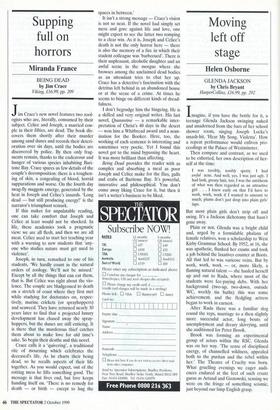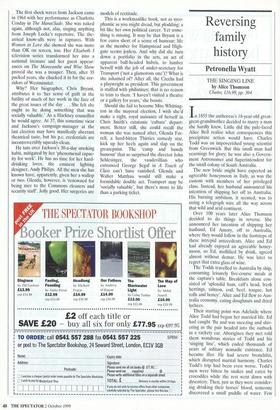Moving left off stage
Helen Osborne GLENDA JACKSON by Chris Bryant ThaperCollins, £16.99, pp. 292 Imagine, if you have the bottle for it, a teenage Glenda Jackson swinging naked and unadorned from the bars of her school shower room, singing Joseph Locke's smash-hit, `Hear My Song, Violetta'. How a repeat performance would enliven pro- ceedings at the Palace of Westminster.
Then compare and contrast, as we used to be exhorted, her own description of her- self at the time:
I was terribly, terribly spotty. I had awful acne. And well, yes, I was just ugly. I had lank, greasy hair, too. I was the antithesis of what was then regarded as an attractive girl . . . I knew early on that I'd have to work, work, work if I wanted to amount to much; plums don't just drop into plain girls' laps.
But most plain girls don't strip off and swing. It's a Jackson dichotomy that hasn't gone away.
Plain or not, Glenda was a bright child and, urged by a formidable phalanx of female relatives, won a scholarship to West Kirby Grammar School. By 1952, at 16, she was apathetic, flunked her exams and took a job behind the laxatives counter at Boots. All that led to was varicose veins. But by work, work, work — or, more likely, a flaming natural talent — she hauled herself up and out to Rada, where most of the students were fee-paying debs. With her background (two-up, two-down, outside WC, weekly tin baths) this was some achievement, and the fledgling actress began to work in earnest.
After Rada there was a familiar slog round the reps, marriage to a then slightly more successful actor, long bouts of unemployment and dreary skivvying, until she auditioned for Peter Brook.
Brook was forming an experimental group of actors within the RSC. Glenda was on her way. The sense of disciplined energy, of channelled wildness, appealed both to the puritan and the rebel within her.' The Theatre of Cruelty was born. What gruelling evenings we eager audi- ences endured at the feet of such ersatz gurus as Artaud and Grotowski, sensing we were on the fringe of something seismic, just beyond our limp English grasp.
The first shock waves from Jackson came in 1964 with her performance as Charlotte Corday in The Marataade. She was naked again, although not alas, singing anything from Joseph Locke's repertoire. The the- atrical know-ails were in raptures. With Women in Love she showed she was more than OK on screen, too. Her Elizabeth I television series transformed her into a national treasure and her guest appear- ances on The Morecambe and Wise Show proved she was a trouper. Then, after 35 packed years, she chucked it in for the cor- ridors of Westminster.
Why? Her biographer, Chris Bryant, attributes it to her sense of guilt at the futility of much of her work in the face of the great issues of the day . .. She felt she ought to be doing something that was socially valuable.' As a Hackney councillor he would agree. At 37, this sometime vicar and Jackson's campaign-manager at the last election may have manifestly aberrant theatrical taste, but his p.c. credentials are incontrovertibly squeaky-clean.
He tuts over Jackson's 30-a-day smoking habit, mitigated by her 'phenomenal capac- ity for work'. He has no time for her hard- drinking lover, the eminent lighting designer, Andy Philips. All the men she has known have, apparently, given her a wallop or two. Glenda, however, is 'renowned for being nice to the Commons cleaners and security staff'. Jolly good. Her surgeries are models of rectitude.
This is a workmanlike book, not as syco- phantic as you might dread, but plodding; a bit like her own political career. Yet some- thing is missing. It may be that Bryant is a few euros short of a sense of humour; life as the member for Hampstead and High- gate seems joyless. And why did she turn down a portfolio in the arts, an act of apparent bull-headed hubris, to lumber herself with the job of under-secretary for Transport ('not a glamorous one')? What is she ashamed of? After all, the Czechs had a playwright as president. This government is stuffed with philistines; that is no reason to trim to them. 'I haven't visited a theatre or a gallery for years,' she boasts.
Should she fail to become Miss Whitting- ton in the mayoral election, I wish she'd make a right, royal nuisance of herself in Chris Smith's catatonic 'culture' depart- ment. Better still, she could recall the woman she was named after, Glenda Far- rell, a hard-bitten Thirties comedy star, kick up her heels again and slap on the greasepaint. The 'camp and bawdy humour' that so surprised the director John Schlesinger, the vaudevillian who entranced George Segal in A Touch of Class can't have vanished. Glenda and Walter Matthau would still make a formidable double act. Transport may be 'socially valuable', but there's more to life than a parking ticket.











































































 Previous page
Previous page